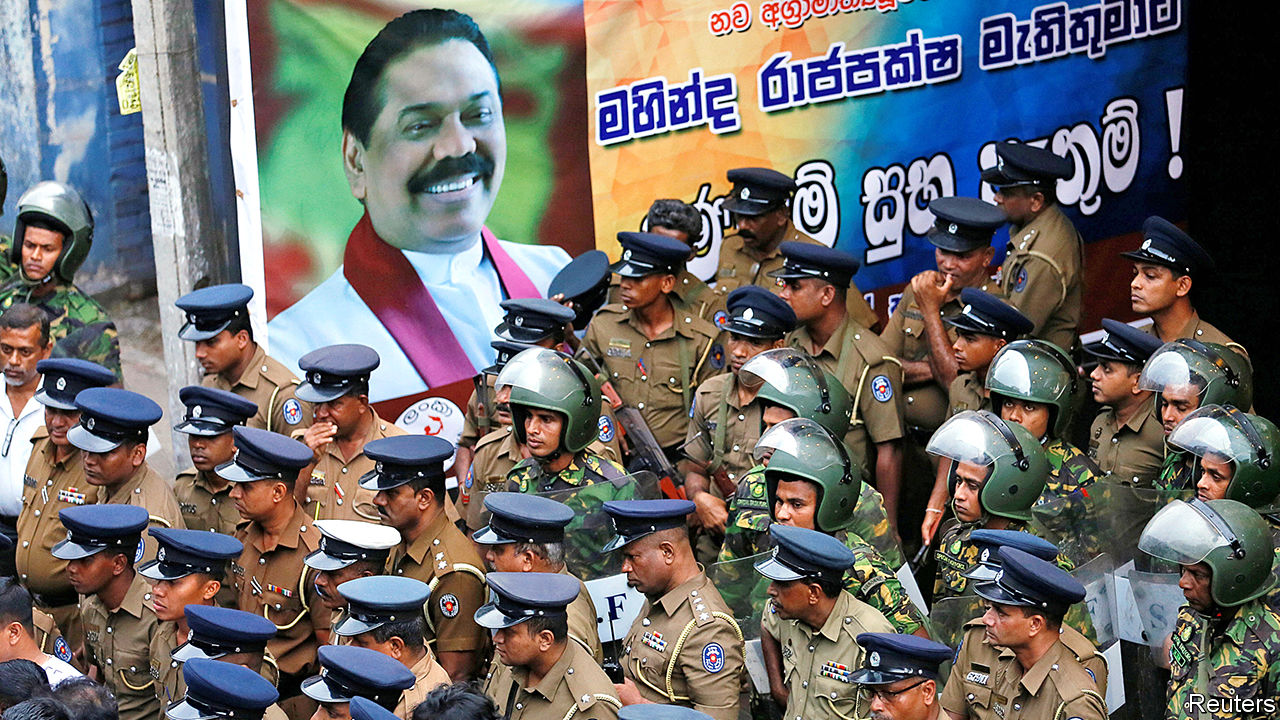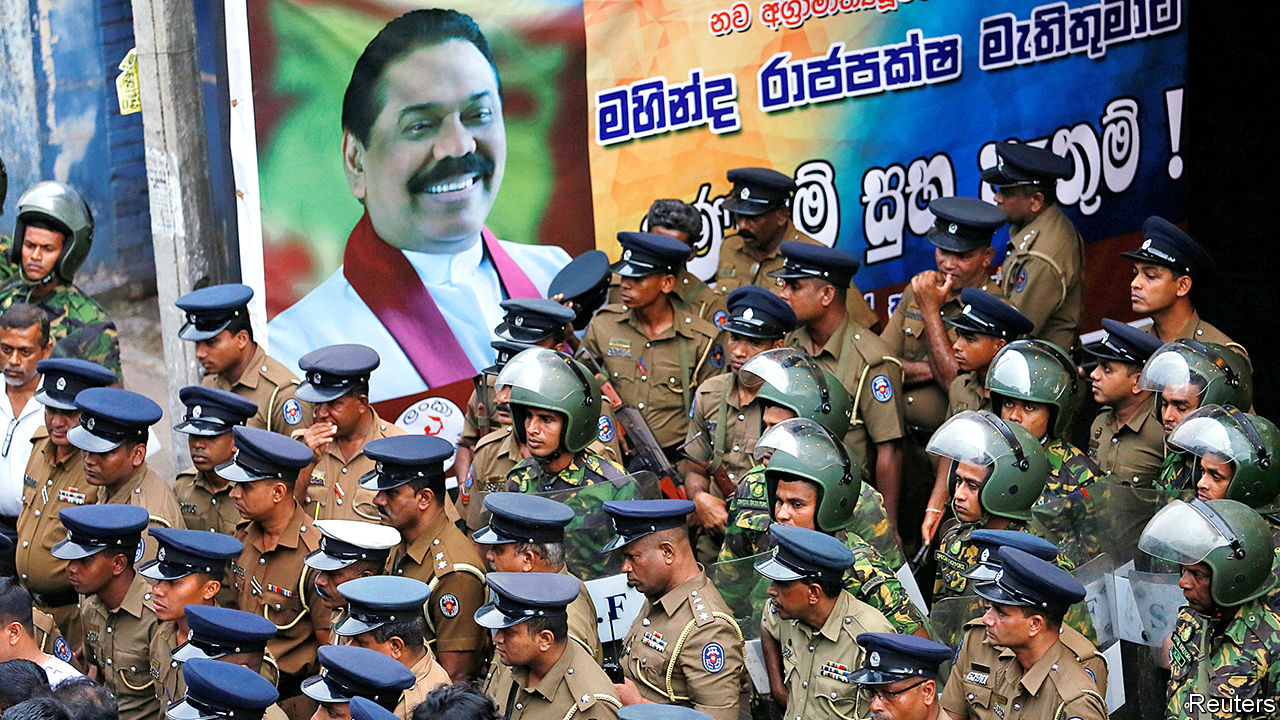
Sri Lanka’s president installs his arch-enemy as prime minister

FIRST TO GO was the navy honour guard, in crisp uniforms with brass buttons. Then the maintenance staff departed, followed by the cooks and gardeners and cleaners. The next day no drivers showed up, marooning a fleet of fancy cars in the compound’s garage. By the third day all but a token ten out of a normal complement of 1,008 dedicated security personnel—round-the-clock shifts of police, watchmen, bodyguards and the like—had abandoned Temple Trees, the stately official residence of the prime minister of Sri Lanka.
Its sole inhabitant, Ranil Wickremesinghe, insists for now on staying. The suave 69-year-old, a four-time prime minister, says he will only leave when it is clear that he is no longer constitutionally entitled to the residence. To his supporters, who have crowded Temple Trees to protect him from eviction, this means when he is no longer able to command a majority in the 225-seat parliament.
Perplexingly for this mildly prosperous island-state of 21m people, it is not clear whether Mr Wickremesinghe can or not. Since October 26th the country has been locked in a constitutional crisis. That evening, without any warning, Maithripala Sirisena, the president, took three shocking steps. He withdrew his party from the ruling coalition, dismissed Mr Wickremesinghe and swore in a replacement. He then “prorogued” or suspended parliament, blocking any debate of all this.
The biggest shock was his choice of prime minister: Mahinda Rajapaksa (pictured), a charismatic strongman who was president from 2005 to 2015. Mr Sirisena loyally served him as a party official and cabinet minister before betraying him by joining Mr Wickremesinghe in a successful bid to unseat him. For the past three years Mr Sirisena has blasted Mr Rajapaksa for alleged nepotism, corruption and human-rights abuses. Now, suddenly, the two have been beaming before the cameras and gleefully blaming all the country’s woes not on each other, but on Mr Wickremesinghe.
Power couple
The president is not popular, but constitutionally wields important powers over the army, judiciary and administration. Mr Rajapaksa, by contrast, remains a hero to many among the island’s 70% Sinhala-speaking, Buddhist majority; his populist rule brought a ruinous quarter-century-long civil war to a brutal close. Earlier this year his new political party won crushingly in local elections. It has been widely predicted to sweep the polls in the next parliamentary election, scheduled for 2020. That, in turn, would almost certainly have brought Mr Rajapaksa back as prime minister by the usual route.
Instead, Mr Rajapaksa has become prime minister in a legally dubious manner. No one disputes that Mr Sirisena has a constitutional right, under Sri Lanka’s hybrid presidential-parliamentary system, to give legislators a holiday. And no one challenges his right to choose any MP who looks likely to muster sufficient votes in parliament as prime minister. But a constitutional amendment introduced in 2015, which was intended to dilute the executive powers that Mr Rajapaksa was widely condemned for abusing, stripped the president of the right to sack the prime minister. Only parliament can do that.
At the time of his dismissal, Mr Wickremesinghe, despite the fading popularity of his government and even after the withdrawal of MPs allied to the president, still controlled the most seats in parliament. He could muster 106 compared with Mr Rajapaksa’s 95. Although that is short of the 113 needed for a majority, in event of a showdown he could probably count on a further 22, from ethnic Tamil and leftist parties loth to see Mr Rajapaksa’s return.
So why, then, did Mr Sirisena suddenly embark on a legally risky course, and Mr Rajapaksa jump to seize a prize that in just a few months’ time he would likely have won by acclamation in any case? It was no secret that the suspicious, earthy president and the polished, aloof Mr Wickremesinghe had grown to detest each other. It was also clear that the prime minister’s camp was moving to accelerate legal challenges to Mr Rajapaksa’s wider family, which has been entangled in a range of lawsuits. Mr Sirisena may also have calculated that, with his term expiring in a year’s time, he would be wiser to win points now with Mr Rajapaksa, than to wait until he had little to offer the likely future prime minister.
Both the president and his newfound ally may have reckoned that they could bluster through any legal challenges to what many have labelled a constitutional coup. In the meantime, by suspending parliament, Mr Sirisena gave the conspirators time to suborn or shanghai enough defectors from Mr Wickremesinghe’s camp to reach the magic 113 MPs. This, in fact, is what has happened. As Mr Wickremesinghe demands a parliamentary vote, his opponents have begun poaching his MPs with offers of cabinet posts and other inducements. Several have joined Mr Rajapaksa’s camp. The president has called a parliamentary session on November 5th, which suggests he has found enough votes.
Mr Rajapaksa’s swift re-emergence, following an abrupt exit only three years ago, has left the country sharply polarised. The large Tamil and Muslim minorities fear a resurgence of Sinhalese nationalism, and an end to already hesitant efforts at post-war national reconciliation. Civil-rights activists fear curbs on free speech and human rights. Businessmen worry that Mr Wickremesinghe’s painstaking but thankless efforts to straighten out the economy may be undone by more populist policies. (Mr Rajapaksa’s profligacy in office has helped push public debt to almost 80% of GDP.) And Sri Lanka’s Western allies and closer neighbours, chief among them India, are concerned that Mr Rajapaksa will steer the country back to a closer embrace of China, his favoured partner in the past.
But it is the president who has earned the most opprobrium. Thinking back to the heady days when Mr Sirisena and Mr Wickremesinghe conspired to unseat Mr Rajapaksa, a minister in the dismissed cabinet shakes his head at the president’s mix of treachery and tenacity. “We thought we were getting a Mandela as president. Instead we got a Mugabe.”
